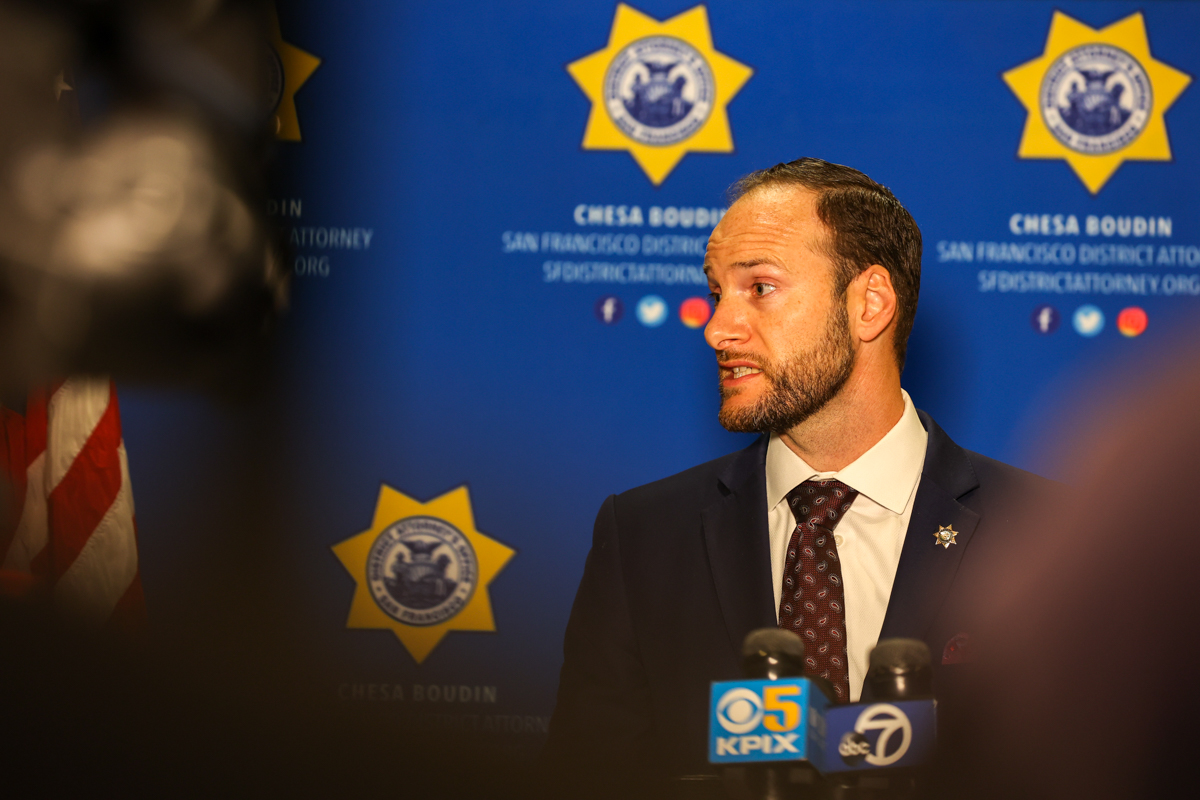An ongoing conflict between San Francisco’s top law enforcement officials escalated Tuesday when District Attorney Chesa Boudin denied allegations that he violated an agreement designed to hold officers accountable—and in turn accused Police Chief Bill Scott of breaking the rules.
The agreement at issue is a key police reform effort that puts the District Attorney’s Office in charge of criminal investigations into police shootings, in-custody deaths and other use-of-force cases in San Francisco. Scott unexpectedly announced last Wednesday that he would sever the agreement over allegations that a District Attorney’s Office investigator felt pressured to withhold evidence while investigating an alleged assault by an officer.
The investigator, Magen Hayashi, was tasked with looking into whether Officer Terrance Stangel—who is now standing trial for assault—committed a crime when he beat a man with a baton while responding to a domestic violence call in 2019.
As part of an unsuccessful motion seeking to dismiss the case against Stangel last month, Hayashi testified that she felt pressured to leave out evidence of the domestic violence from an affidavit for his arrest. She also said she did not tell a police investigator who was also looking into the incident that she interviewed a witness because her office did not share information with the police—they only received it.
But in a letter to the chief Tuesday, Boudin said the allegation that Hayashi felt pressure to leave out information from the arrest warrant had no bearing on the agreement. And he argued that the other allegation—that she did not disclose the witness interview to police—was not a violation of the agreement because the case against Stangel is ongoing.
At the time of the alleged non-disclosure in 2019, Boudin said, the agreement only required the District Attorney’s Office office to share information with the police “upon declination of criminal charges or upon completion of all prosecutions.” Boudin renewed and updated the agreement with Scott in 2021 to include new language that requires his office to share information with police “as soon as practicable and as legally permissible.”
On the other hand, Boudin said, police did not initially share evidence with his office as required by the agreement, including photos of the victim in the hospital as well as emails, notes and police reports related to the incident. All of these actions violated the agreement in “critical ways,” Boudin wrote.
Despite these violations, Boudin said, the District Attorney’s Office has not pulled out of the partnership and wants to continue investigating police shootings under the agreement.
“I believe that this lack of compliance must be addressed—and can be done so through a good-faith conversation,” Boudin said.
Thus far, Scott is standing by his decision.
In response to the letter Tuesday, a spokesperson for the chief, Matt Dorsey, said in a statement that Scott disagrees with Boudin on key portions of the agreement.
“Procedural minutiae from an underlying case that the District Attorney extensively details in his six-page letter don’t diminish the fact that a D.A.’s investigator testified to ongoing practices by the D.A.’s office to violate its [agreement] with SFPD,” Dorsey said.
Scott is facing scrutiny from the Police Commission for withdrawing from an agreement that a consultant for the California Department of Justice, which is monitoring police reforms in San Francisco, recently hailed as a key effort to that process.
The chief asked the DOJ to take the place of the District Attorney’s Office as independent investigator—or to offer guidance on another alternative—in a letter last Thursday to California Attorney General Rob Bonta.
Scott broke the agreement as the city’s police union considered taking a vote on no confidence in the chief.
The Police Commission will discuss these issues Wednesday night and could order the chief to reverse course on his decision in a subsequent meeting.
This story has been updated to include comments from SFPD.
